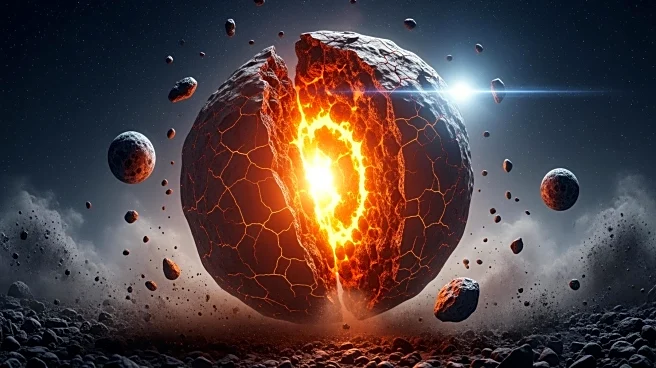What's Happening?
A team of researchers from the Massachusetts Institute of Technology (MIT) has discovered remnants of the original material from 'proto Earth,' a primitive form of Earth that existed over four and a half billion years ago. This discovery was made through
the analysis of meteorites, which served as time capsules from different points in the solar system's history. The researchers identified a unique chemical anomaly in ancient rock samples, specifically a potassium isotopic imbalance, which suggests these rocks predate the current composition of Earth. This finding provides a tangible link to the early stages of Earth's evolution, a period previously thought to be erased by a catastrophic collision with a Mars-sized object that led to the formation of the Moon.
Why It's Important?
The discovery of proto Earth's remnants is significant as it offers new insights into the early chemical composition of Earth, challenging previous assumptions about the planet's origins. This research could reshape our understanding of Earth's formation and the processes that led to its current state. By identifying the potassium isotopic anomaly, scientists can trace the building blocks of Earth, potentially leading to new theories about planetary formation and evolution. This breakthrough has implications for the fields of geology and planetary science, as it opens up new avenues for research into the history of our solar system and the conditions that led to the development of life on Earth.
What's Next?
The MIT research team plans to continue their analysis of ancient rock samples to further explore the potassium isotopic signatures. This ongoing research may uncover additional anomalies that could provide further evidence of proto Earth's composition. The findings could prompt other scientific teams to re-evaluate existing meteorite inventories and conduct similar studies to expand our understanding of Earth's origins. Additionally, this discovery may lead to collaborations between geologists and planetary scientists to develop new models of Earth's formation and evolution.
Beyond the Headlines
This discovery raises ethical and philosophical questions about our understanding of Earth's history and the broader universe. It challenges the completeness of current scientific inventories and suggests that there is much more to learn about the origins of our planet. The research highlights the importance of interdisciplinary collaboration in advancing scientific knowledge and encourages a reevaluation of established theories in light of new evidence.
















